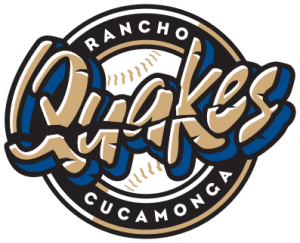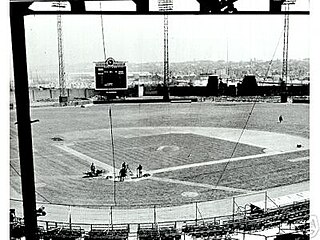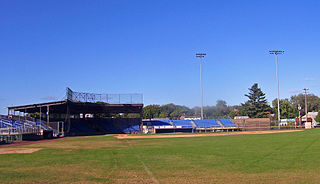Related Research Articles

The Los Angeles Angels were a professional baseball team based in Los Angeles that played in the "near-major league" Pacific Coast League (PCL) from 1903 through 1957.

The Rancho Cucamonga Quakes are a Minor League Baseball team of the California League and the Single-A affiliate of the Los Angeles Dodgers. They are located in Rancho Cucamonga, California, and play their home games at LoanMart Field.
The Salem-Keizer Volcanoes are a baseball team located in Keizer, Oregon, who are charter members of the Mavericks Independent Baseball League, a four-team league entirely based in the Salem Metropolitan Statistical Area and playing all their home games at Volcanoes Stadium. From 1997 to 2020, they were members of Minor League Baseball's Northwest League as the Class A Short Season affiliate of the San Francisco Giants. With the reorganization of baseball after the 2020 season, the Volcanoes were not offered a player development license with any Major League Baseball club, though the Volcanoes promised to continue play in 2021, a promise they kept in forming the Mavericks League.

The Vancouver Mounties were a high-level minor league baseball club based in Vancouver, British Columbia, that played in the Pacific Coast League (PCL) from 1956–62 and 1965–69. Its home field was Capilano Stadium. During the Mounties' first two seasons, 1956–57, the PCL still was a member of an experimental organized baseball ranking, the Open Classification, as it made a bid for Major League status. However, in 1958 the PCL reverted to Triple-A when the Dodgers and Giants moved to California.

The Road Warriors are a professional baseball team owned by the Atlantic League of Professional Baseball. The traveling team has operated intermittently throughout the league's history, usually being activated in years when the league otherwise has an odd number of teams.

The Jersey City Giants was the name of a high-level American minor league baseball franchise that played in Jersey City, New Jersey, as the top farm system affiliate of the New York Giants from 1937 through 1950. The Jersey City club played in the International League. They were commonly referred to as the Little Giants.

Delano-Hitch Stadium is a stadium in Newburgh, New York; it has a current capacity of 3,100.
The North Atlantic League was the name of two minor baseball leagues. The first was a Class D affiliated system that operated from 1946 until 1950, and the second was an independent minor league that played from 1995 until 1996. Three of that league's franchises joined the Northeast League after the folding of the North Atlantic League.
The 1947 New York Giants season was the franchise's 65th season. The team finished in fourth place in the National League with an 81–73 record, 13 games behind the Brooklyn Dodgers. It was the first season to be broadcast on television, with WNBT acting as the official team television broadcast partner.
The 1948 Boston Braves season was the 78th consecutive season of the Major League Baseball franchise, its 73rd in the National League. It produced the team's second NL pennant of the 20th century, its first since 1914, and its tenth overall league title dating to 1876.
The history of the Los Angeles Dodgers begins in the 19th century when the team was based in Brooklyn, New York.
Louis Aaron Haneles was a minor league baseball player, manager, general manager and owner.
The Newburgh Night Hawks were a minor league baseball team based in Newburgh, New York. The team played in the Northeast League, a professional independent baseball league, and as such none of its teams had an affiliation with Major League Baseball. The team existed from 1995 to 1996 and played its home games at Delano-Hitch Stadium in Newburgh.
The Stamford Pioneers were a minor league baseball team based in Stamford, Connecticut. From 1947 to 1949, Stamford teams played as members of the Class B level Colonial League, winning the 1947 championship with an integrated roster in the era of segregated baseball. The Pioneers were preceded by the 1947 Stamford Bombers, with the teams hosting minor league home games at Mitchell Stadium.
The Mahanoy City Brewers was the final and primary moniker of the minor league baseball teams based in Mahanoy City, Pennsylvania between 1887 and 1950. Mahanoy City teams played as members of the Central Pennsylvania League (1887–1888), Anthracite League (1924) and North Atlantic League (1946–1950). Mahanoy City was an affiliate of the Boston Braves in 1946.
The Peekskill Highlanders were a minor league baseball team based in Peekskill, New York. Early "Peekskill" teams played as members of the Class C level Hudson River League before the Highlanders were members of the Class D level North Atlantic League from 1946 to 1949. The Peekskill Highlanders hosted home games at Peekskill Stadium and were a minor league affiliate of the New York Giants in 1946 and 1947 and St. Louis Browns in 1948.
The Carbondale Pioneers was the final and primary moniker of the minor league baseball teams based in Carbondale, Pennsylvania between 1895 and 1950. Carbondale teams played as members of the Pennsylvania State League in 1895 and 1896 and North Atlantic League from 1946 to 1950. The Carbondale Pioneers were a minor league affiliate of the Philadelphia Phillies from 1947 to 1950, winning league championships in 1947 and 1948. The Pioneers hosted minor league home games at Russell Park.
The Nyack Rocklands were a minor league baseball team based in Nyack, New York. The Rocklands were unofficially nicknamed the "Rockies" and played as members of the Class D level North Atlantic League from 1946 to 1948. The 1947 Nyack Rocklands were a minor league affiliate of the Philadelphia Athletics. Nyack hosted home minor league games ay Nyack High School.
The Newburgh Taylor–mades was a primary name of the minor league baseball teams based in Newburgh, New York. Between 1886 and 1914, Newburgh teams played under numerous nicknames as members of the Hudson River League, 1913 New York-New Jersey League in 1914 Atlantic League, hosting home games at the West End Park and Driving Park.
The Nazareth Barons were a minor league baseball team based in Nazareth, Pennsylvania. From 1946 to 1950, Nazareth teams played exclusively as members of the Class D level North Atlantic League, qualifying for the 1946 playoffs and finishing in last place in both of their final two seasons. Nazareth was a minor league affiliate of the Detroit Tigers in 1947. Nazateth hosted home minor league home games at Nazareth Borough Park.
References
- ↑ "The Newburgh News - Google News Archive". 1946-05-21. Retrieved 2011-11-15.
- ↑ "Lou Haneles Minor Leagues Statistics & History".
- ↑ "Paper of Record". Paperofrecord.hypernet.ca. Retrieved 2011-11-15.
- ↑ Kingston Daily Freeman, November 15, 1947, p. 7
- ↑ "Nick Testa Minor & Japanese Leagues Statistics & History".